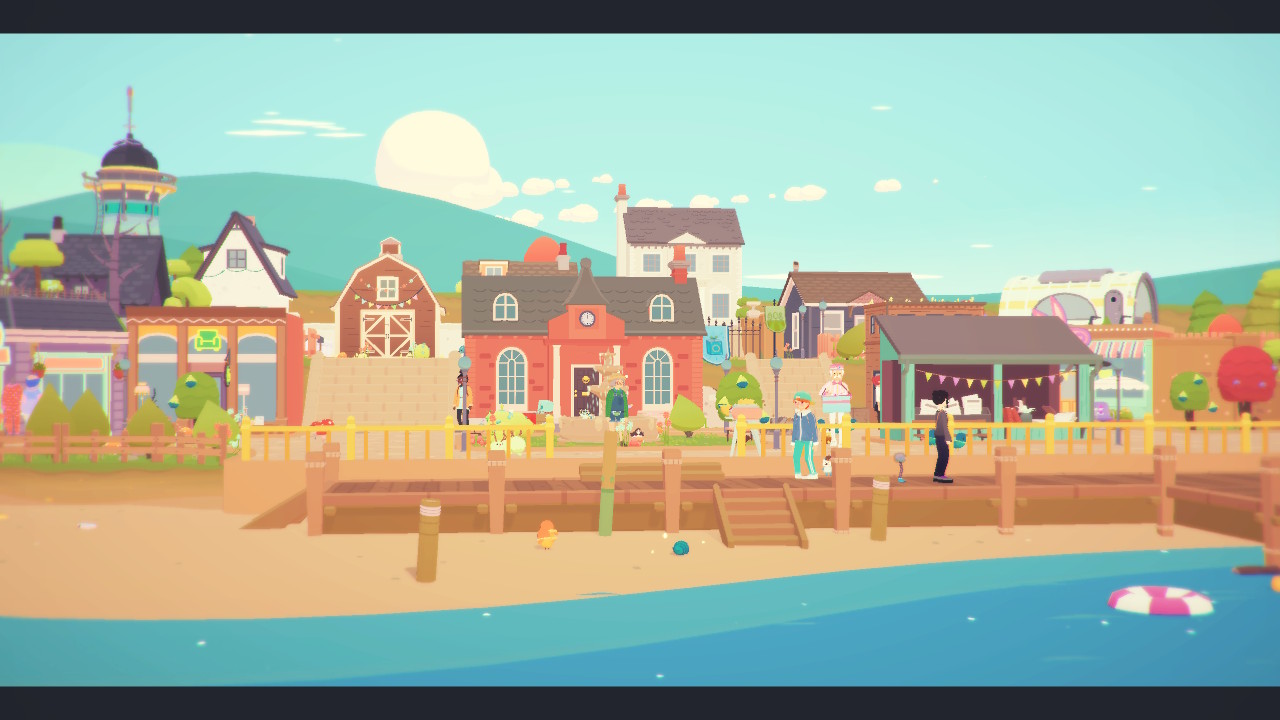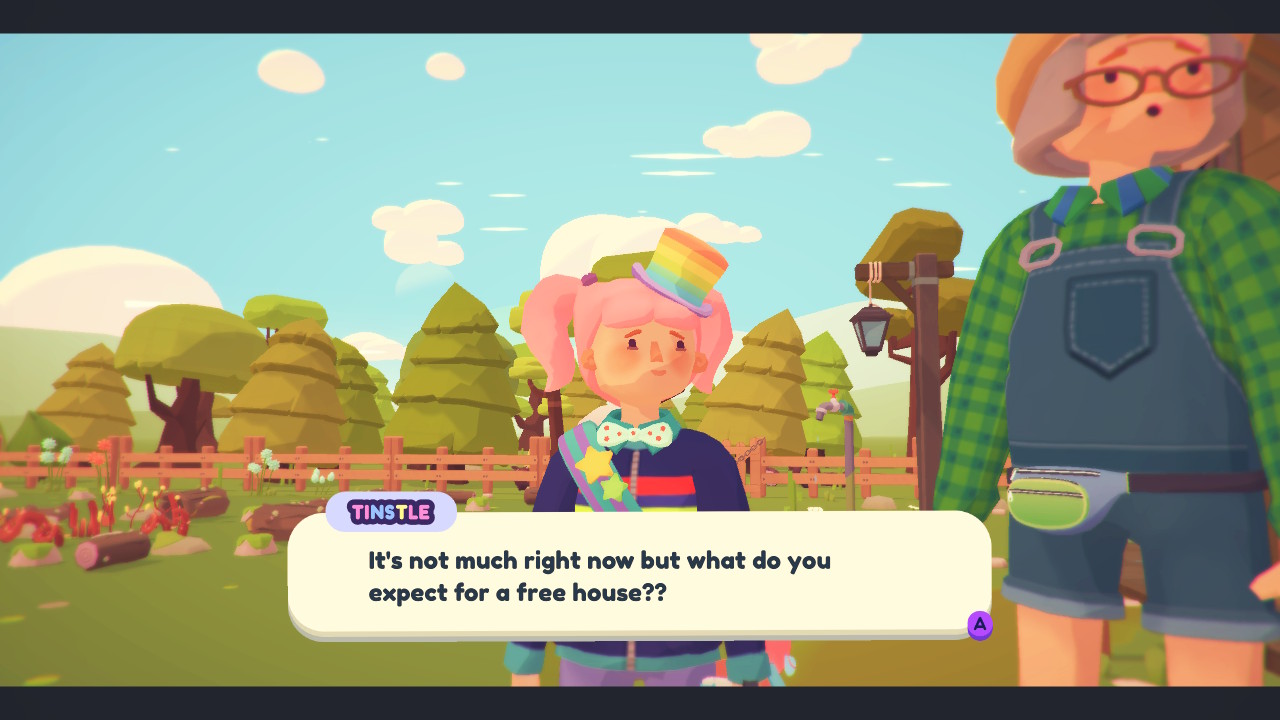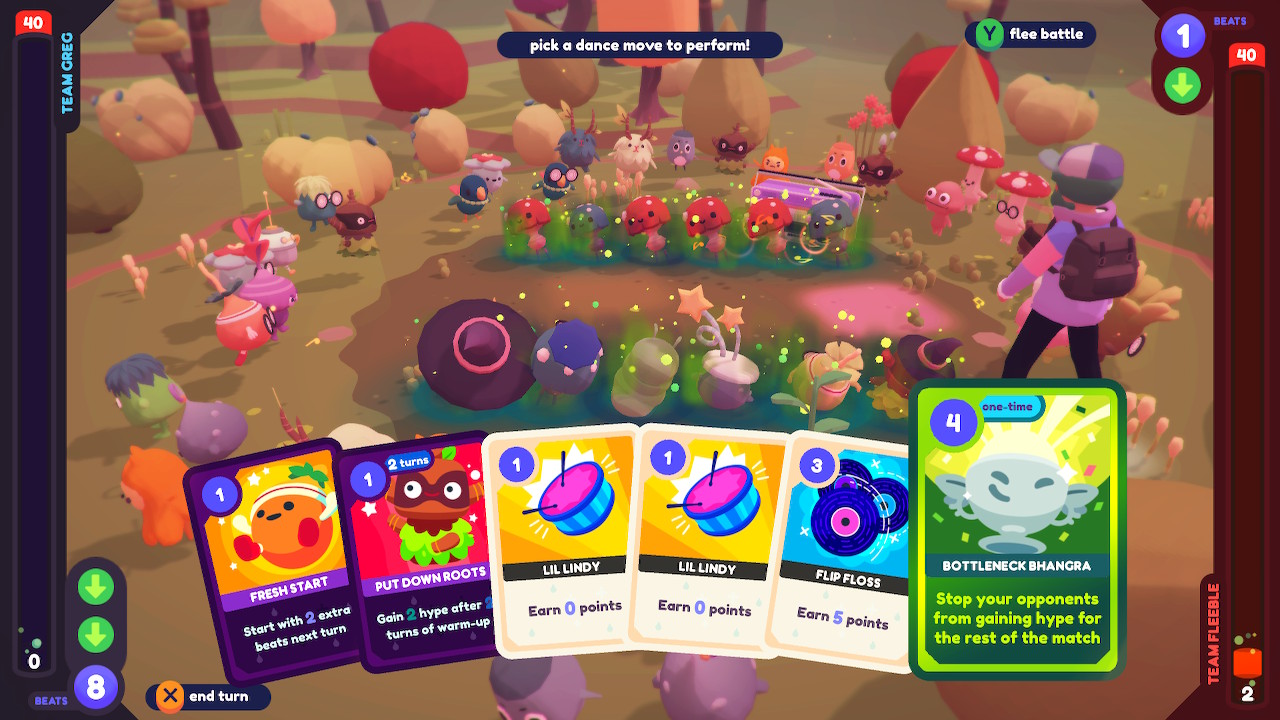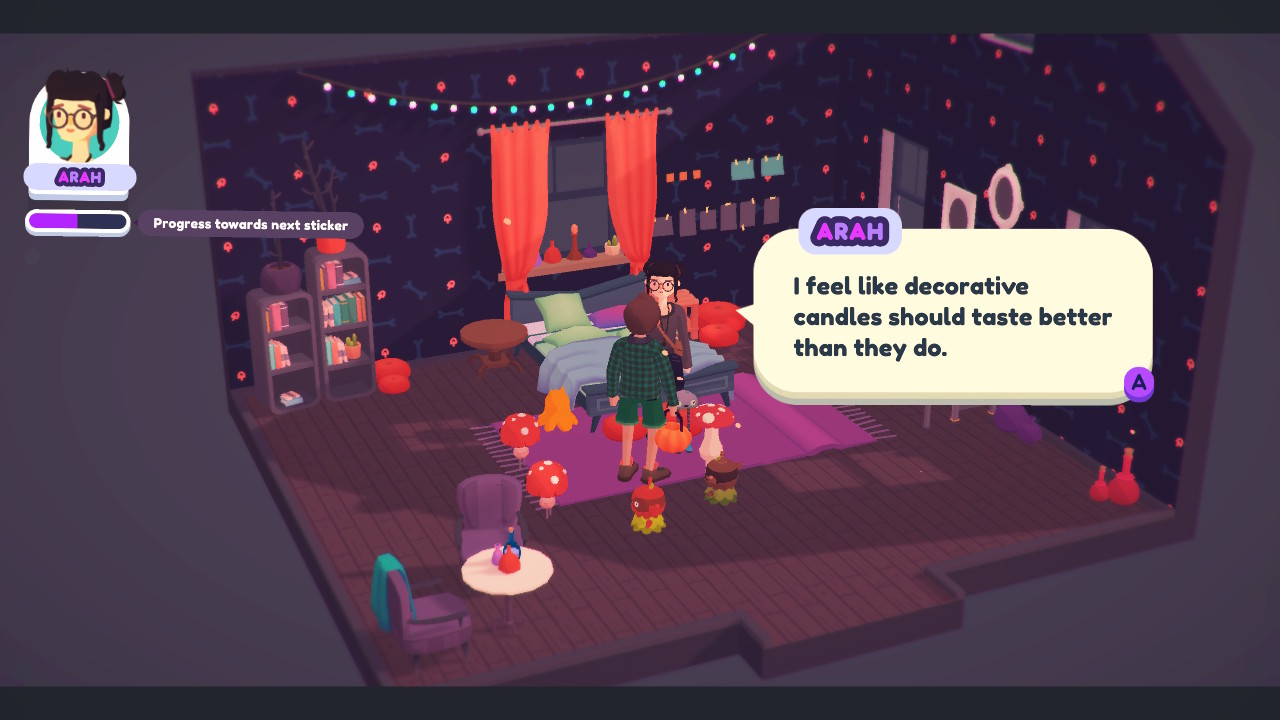Hold on to your pompadoots because, after six years of loving labor, Glumberland is fully releasing Ooblets. This charming indie gem has been in early development as devs steadily worked to introduce new areas and gameplay options as they neared 1.0. Now that it’s live, folks are free to leave Aroh Island and explore mainland Oob, for better or worse.
So, what’s an ooblet, you ask? They’re goofy little sentient (though apparently daft) plant creatures that inhabit most of Oob. They come in all shapes and sizes, and each species has a few variations that denote rarity so collectors can enjoy the thrill of the hunt. The thing about ooblets, though, is they don’t resort to fisty-cuffs to settle their differences. Indeed, ooblets one day learned the joy of dance and never turned back, engaging in dance battles as needed. When they’re not trailing after you across Oob, they’ll mill about your farm where you can settle them into oobcoops. If they’re in those coops, they tend any crops adjacent to their tiny homes with varying degrees of helpfulness. More coops on the homestead allow for more ooblets so you can steadily catch more varieties. In the meantime, if you run out of room, there is also the local Wildlands, a reserve where you can leave ooblets to roam (don’t worry: you can retrieve them whenever you wish!)
Knowing what they are, it’s easy to wonder how you could have lived your life without ooblets. One might say that, before this game, your life was a complete toot. At least, that’s what the narrative tells us. So, you decide to head to Badgetown on the mainland in search of a fresh start. Conveniently, the delightful Mayor Tinstle greets you and bequeaths you a vacant, run-down farm to call your own. And while you don’t have the titular ooblets yet, the local clubs are more than happy to welcome you to their ranks and donate one. While hardly a revolutionary start, Ooblets does lead players along an exciting and quirky story. It’s clear within the first few days that something is awry in the cute, seemingly innocent locale of Badgetown. The more you chat with and offer to help Tinstle and the key NPCs, the more you understand them. The more you get to know them and poke about town, you uncover a deep plot of intrigue that doesn’t shy away from political commentary and disparaging the corporate hellscape late-stage capitalism seems to be plunging us into. Or you could just stay and farm. That’s cool, too.

Committing to that pastoral life is pretty familiar if you have a farming sim or two in your play history. You buy seeds at the local seed dispensary (Meed is pretty cool, though she’s maybe buried a body or two in her garden!?), clear your land, till plots, plant, water, and wait. Eventually, you’ll be rolling in muz, caroots, freeps, thimbis, and myriad bizarre plants unique to Oob. You can sell your hard-won produce for Gummies (an apparently edible currency, if you know where it’s been), fulfill shipments for higher income, create a delicious meal, or use them in several other ways, from fetch-quests to dance battles. You spend a lot of your time trying to grow the right product for the right occasion, and there are occasions aplenty.
The progression system sets Ooblets apart from other sims, and Glumberland has hit a winning formula by giving you just enough specific to-dos to hook you in and leave you wanting more. When I wasn’t playing Ooblets, I found myself asking why I wasn’t, as it has an addictive rhythm. It’s only near the final stretch that one of the game’s locales throws in some irredeemably frustrating fetch quests that severely disrupt the pacing. But if you’ve got some chill, that may not hold true.
So, there are lots of to-doozles, but what exactly can you do …zle? Every day you have new tasks to take on in addition to the Mayor’s overarching goals to help the town and anything you’ve agreed to do for the community. These are generally some combination of “grow this,” “fetch that,” “dance-battle them,” or “find my ooblet,” but they vary enough to stay fresh (and occasionally breaking the narrative fourth wall helps). Unique conversations with the key NPCs and earning friendship points with them is another way to pass the time. When the bar pops, you get some sweet (if useless) stickers and presents. And thankfully, Ooblets doesn’t have you running about learning everyone’s birthdays or favorite foods. Instead, there’s a system where you only focus on one person’s daily needs for a big boost in friendship if you want to. Superfluous gifts will otherwise be politely declined.

That’s cool and all, but what about the dance battles?! Yes, sorry, I’ve been dancing around that, haven’t I? I’d see myself out, but this review won’t write itself. Ooblets does have this fantastic battle system that is fun to figure out and keeps the game moving along as a complement to the sim gameplay. These battles play out via turn-based card combat, as you spend your beats to whip out sweet moves that cause a range of effects and score you points. The point total varies depending on the number of ooblets in the dance battle. The goal is always the same: Max out your point total or get the most points before the match ends. Each team has a base deck of cards, but each ooblet can acquire up to three moves to add to your deck as they gain levels. Some actions stun, some boost or diminish point gain, others can steal, and so on. The system’s genius is getting to know what each ooblet is capable of and building a neat team combo to capitalize on your opponent’s style. Unfortunately, most battles aren’t very challenging. I barely struggled, only losing if I assembled a bad team setup or RNG took me down and I couldn’t get the point gain cards I needed. The AI doesn’t seem too bright, often playing whatever cards it can in no particular order. I’d scratch my head as they’d play all their point cards then use their last beat to add hype (which boosts the points you earn), wasting the effectiveness of the buff in the first place. There are loose plans to hopefully add multiplayer to the game, which means more challenging dance battles, and I look forward to that day, should it come.
Many story beats require dance battles, but the stakes are low because you can usually try again. There’s also the Badgetown Dancebarn you can visit for daily tournaments. These tournaments are three rounds with special rules and typically have some rad rewards if you win. Because of the special rules, these tend to be a touch more fun and sometimes challenging, but also where you see limitations of the AI revealed. That aside, the most important use of dance-battling is to grow new ooblets. Wild ooblets rove about the various locations of Oob in small groups, ready to take on any challenger. However, you need specific items to coax them into dancing, ranging from easily acquired foraged goods to complicated culinary delights. Once you surrender these treabies, you can choose your dance troupe and let the battle commence. If you win, you can get a seed from the losing team’s leader, which you’ll grow back at your farm, adding a new friend there.

So you’ve got quests, farming, friendships, and dance battles — is there anything else? Why yes, there is. Eventually, you can open a storefront, allowing you to sell, you know, mushrooms that anyone could pick up. Or the crops you grow, ooblet accessories you don’t need, food you make, that kinda stuff. At the end of each day, you score experience toward the store based on sales and how well you haggle prices, allowing you to upgrade. It’s a bit of clunky gameplay but offers a nice shift from the monotony of farming. Then, between agriculture and entrepreneurship, you’ll be rolling in the gummies! You can spend them at the local clothing and home decor shops, get your hair did, or buy a spressy (or six). There are many dope, hip threads to slap on your body and plenty of paint, flooring, and furniture to plunk in your home. Unfortunately, there’s a lack of variety in the color scheme. What you see is what you get for a given item, so you’ll need to design with that in mind.
And if that isn’t enough to keep you busy, there are minigames! You can spend your money on tokens for the Port Forward arcade games. Frustratingly, you need to play them as part of the story (though there is a workaround if you don’t want to “get gud” at all six games). At least they are fun adaptations of tried and true app games, so your mileage may vary. And you earn tickets you can exchange for neat prizes! Or you can make money by visiting the local news dirigible (yup, it’s a thing) complete with its own off-brand J. Jonah Jameson and play a slide-puzzle minigame to help print the papers.

But that’s it. That’s what every day of Ooblets has in store for you if you have the energy for it. Aside from talking, running, and supporting your ooblets in dance battles, you use energy for farming activities and picking things up. As your total energy dwindles, you can’t run as much until you eat more food or drink your eighth beanjuice (coffee) of the day. When stamina runs out, you more or less are asleep on your feet, and you complain about needing a nap but never actually pass out. In fact, you can pull all-nighters, though each day reduces your energy total until you get a good sleep. But once your head does hit the pillow, you’ll realize that everything you’ve done isn’t meaningless! Pretty much everything you do is tallied toward your personal experience at each day’s finale. When you level up, you get more options at the wishy well. Hey, woah, another gameplay mechanic? You bet your bunglebee buns! The well is where you can spend wishies, earned through various daily tasks and quests, to upgrade the town, raise your stamina, unlock better recipes, introduce more ooblets to Badgetown, and more. It’s a neat take on the progression system for a sim-style game, though as you get further into the story, wishies are harder to come by, so be sure to spend them wisely.
Or don’t! The beauty of Ooblets is that you can do what you want with cute or ugly little creatures and dance the night away with big zillenial energy. You like Animal Crossing, Story of Seasons, and watching Bee and Puppycat while saying, “Okay, boomer?” Cool. You’ll dig this. It oozes style with its quirky pastel art direction, quippy writing, and delightful color palettes. With dance battles as a staple, it obviously necessitates the freshest of beats by Pedro Silva, from chill vibes to kitschy elevator muzak (and more than a few bops!) While most of the locations aren’t as exciting as Badgetown, the framerates (on Switch, at least) chug in the larger maps, there’s some slow loading, the UI is tiny in handheld, and there is a bit of glitchy jank to work out; there’s a lot to gab about. It’s clear there’s a devoted team that set out knowing the cozy little game it wanted to make, and what they’ve created is a pleasure to play. So get out there and become a farming mogul or a titan of commerce or revel in the strategy of dancing — if you like nice things, then you’re sure to enjoy Ooblets.



